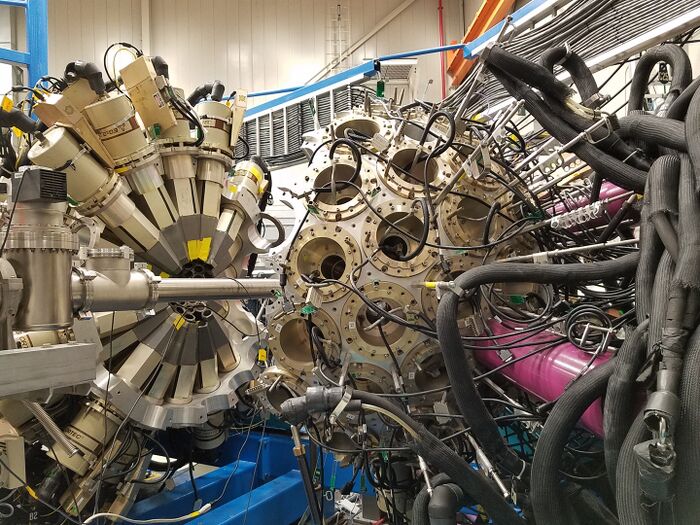Gammasphere: Difference between revisions
No edit summary |
No edit summary |
||
| Line 7: | Line 7: | ||
poly 267 397 471 683 203 419 [[The Slope Box]] | poly 267 397 471 683 203 419 [[The Slope Box]] | ||
</imagemap> | </imagemap> | ||
Gammasphere is the world's most powerful spectrometer for nuclear structure research. Built in the early 1990s, it centers around unique experiments involving nuclear physics. It is particularly tailored to collect gamma ray data following heavy-ion fusion. | Gammasphere is the world's most powerful spectrometer for nuclear structure research. Built in the early 1990s, it centers around unique experiments involving nuclear physics. It is particularly tailored to collect gamma ray data following heavy-ion fusion. Beams of ions are directed at a target (usually a thin metal film). Nuclei from the beam fuse with those in the target, producing highly excited, much heavier nuclei. Gammasphere detects gamma rays — high-energy light particles — emitted from the excited nuclei as they spin and cool. This is done with 110 [[High Purity Germanium (HPGe)]] [[Gammasphere Detectors|detectors]]. Each germanium detector is surrounded by bismuth germanium oxide (BGO), which allows for the suppression of background resulting from gamma-rays whose energies are not completely absorbed by the germanium detector. The data is collected using hardware on Gammasphere and on each detector. | ||
==Hardware== | ==Hardware== | ||
==Researcher Data Acquisition== | ==Researcher Data Acquisition== | ||
Revision as of 21:10, February 10, 2023
Gammasphere is the world's most powerful spectrometer for nuclear structure research. Built in the early 1990s, it centers around unique experiments involving nuclear physics. It is particularly tailored to collect gamma ray data following heavy-ion fusion. Beams of ions are directed at a target (usually a thin metal film). Nuclei from the beam fuse with those in the target, producing highly excited, much heavier nuclei. Gammasphere detects gamma rays — high-energy light particles — emitted from the excited nuclei as they spin and cool. This is done with 110 High Purity Germanium (HPGe) detectors. Each germanium detector is surrounded by bismuth germanium oxide (BGO), which allows for the suppression of background resulting from gamma-rays whose energies are not completely absorbed by the germanium detector. The data is collected using hardware on Gammasphere and on each detector.
